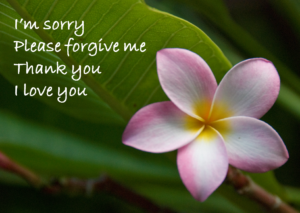Dr. Len’s Story. In the 1980s a new clinical psychologist named Dr. Ihaleakala Hew Len joined the staff at Hawaii State Hospital. He was hired to head a special ward for mentally ill criminals convicted of felonies such as murder and kidnapping. This part of the hospital suffered from chronic absenteeism and high turnover. The atmosphere was oppressive and the patients were aggressive. According to one story from a nurse who used to work there, the ward was so bleak and decayed that paint wouldn’t even stick to the walls.
Despite the dangerous and demoralizing environment, Dr. Len accepted the position. The staff did not have much hope that anything would change under his leadership; in fact, they expected him to be gone within a month. They were surprised when, instead of proposing initiatives to improve the situation, Dr. Len spent his days in his office by himself. He never saw patients. Instead he asked to see their case files and he asked to not be disturbed while reviewing them.
After several months, the atmosphere in the hospital showed signs of improvement. Patients were less violent and needed fewer pharmaceuticals and restraints. Morale began to improve and absenteeism began to fall. Staff questioned the doctor about what he was doing in his office.
Dr. Len explained he would study each case file and cleanse the memories he had in common with each patient. Incredulous, the employees asked how he did that. He replied, “I’m sorry, forgive me, I thank you, I love you.”
Dr. Len worked at the hospital for almost four years. At the end of that time, the ward closed its doors because there were no more patients. They had either been cured or it was no longer necessary for them to remain in that ward.
I’m sorry. Please forgive me. Thank you. I love you.
These four phrases are simple and familiar. However, when used with intention and awareness, they have the potential for powerful transformation. Together, they are known as Ho’oponopono, an ancestral Hawai’ian custom used by kahunas (Huna priests) to provide deep healing.
Ho’oponopono is an integral part of Huna, the traditional healing and spiritual shamanism of Hawai’i. According to The Book of Ho’oponopono by Bodin, Lamboy and Graciet, it was invoked “to make right, establish harmony, correct what is wrong, and restore things to order.” “Ho’o” is “to make”, “pono” is “right”. Repeating the word pono means “doubly right” or being right with both self and others.
Dr. Len’s Teacher. Historically, when individuals or families had disagreements, they would gather together and be guided in a forgiveness ritual and practice led by a kahuna. Ho’oponopono was a closely guarded secret until the late ’70’s when shaman and plant healer Morrnah Simeona began to develop a new form of Ho’oponopono that allowed individuals to use the practice without the presence of a priest or guide. Morrnah’s mother was a kahuna lapa’au kahea (one who heals with words and chants) who was a lady-in-waiting to Queen Lili’uokalani, the last monarch of the Kingdom of Hawai’i. Morrnah began her oral training from her mother at age three and practiced the healing arts throughout her life.
Morrnah believed that we are weighed down by our memories. Ho’oponopono helps us to free ourselves of these memories and beliefs. By removing the veil that they form, we can discover (remember) the divinity within ourselves. We are much more than our memories. When our memories are released, they are transmuted into pure energy, a kind of alchemical process that transforms fears and memories into love.
Morrnah shared her more modern version of Ho’oponopono at the Huna World Convention in 1980. With her approach, individuals can grant themselves forgiveness, peace, and love on their own. With this change, Ho’oponopono became available to everyone.
How to Perform Ho’oponopono. I’m sorry. Please forgive me. Thank you. I love you. These phrases are shorthand. “I’m sorry” is short for “I’m sorry I was unaware that I carried that memory inside of myself.” “Please forgive me” is said to the divinity you carry within yourself. You ask for assistance in self-forgiveness because you allowed your memories to lead you astray. “Thank you” is to the memories that have appeared to you and given you the opportunity to release them. “I love you” is said to both your memories and yourself. By showing yourself compassion, forgiving yourself, thanking yourself and sending yourself love, you erase the memories that lead to suffering. As your suffering disappears, it also disappears from the other person.
I was introduced to Ho’oponopono during my meditative studies. The version I heard was “I’m sorry for the pain I have caused. Please forgive me, for I did so unknowingly. Thank you for showing me where I needed to heal. I love you, the messenger who allowed me to see and release this pain.” There are probably many permutations of Ho’oponopono as it has made its way into the world. These two versions reflect the ancient teaching that everything we see out in the world is a reflection of our inner world. If we want peace outside, we need to have peace first on the inside. We are responsible for what we see externally. If we see it, we can heal it. If we see it and it bothers us, we need to heal it for it is a reflection of something unhealed within us.
I’m sorry. Please forgive me. Thank you. I love you. When we heal ourselves, we heal the world.
Resources: The Book of Ho’oponopono: The Hawaiian Practice of Forgiveness and Healing by Bodin, Lamboy and Graciet. Destiny Books. 2012.
The Hawaiian Secret of Forgiveness, Matt James, Ph.D., Psychology Today, May 23, 2011, retrieved Nov 3, 2019.
How Dr. Hew Len healed a ward of mentally ill criminals with Ho’oponopono, Rosario Montenegro, Global Family Group, retrieved Nov 3 2019.

